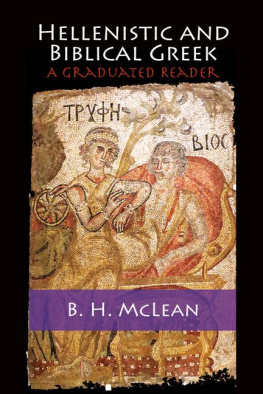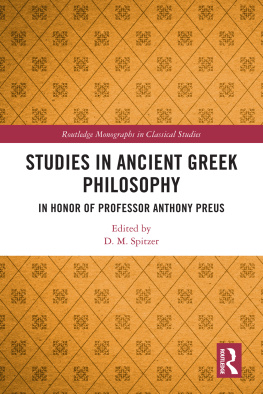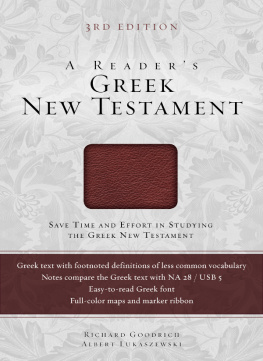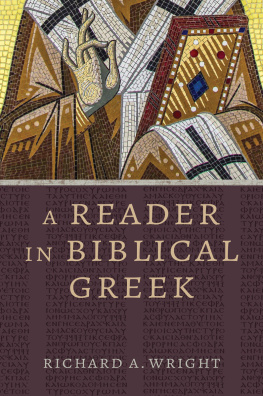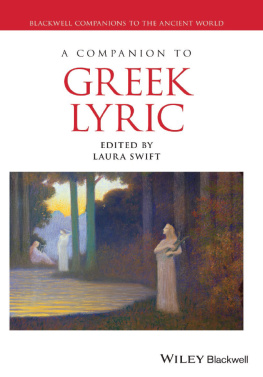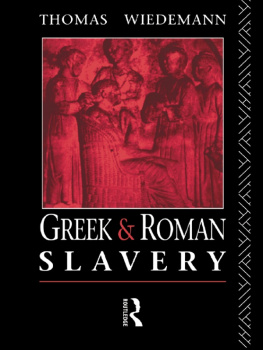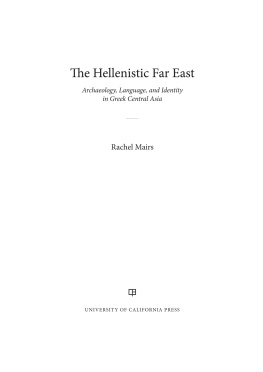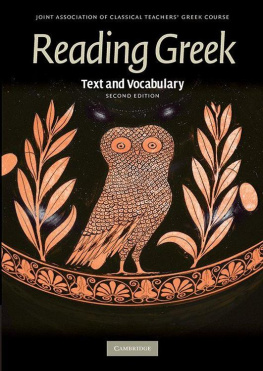Hellenistic and Biblical Greek
This Hellenistic Greek reader is designed for students who have completed one or more years of Greek and wish to improve their reading ability and gain a better appreciation for the diversity of the language. The seventy passages in this reader reflect different styles, genres, provenances, and purposes and are arranged into eight parts according to their level of difficulty. Grammatical support and vocabulary lists accompany each passage, and a cumulative glossary offers further assistance with translation. Students are led to a deeper understanding of Hellenistic Greek and a greater facility with the language.
- Includes canonical and non-canonical Christian texts, Septuagint (prose and poetry), Jewish pseudepigrapha, inscriptions, and Jewish and Hellenistic literary Greek.
- Includes a Web component with more than thirty additional readings for classroom and independent use.
- Offers a glimpse into the everyday life of Hellenistic Greeks, with themes such as sexuality, slavery, magic, apocalypticism, and Hellenistic philosophy.
B. H. MCLEAN is Professor of New Testament Language and Literature at Knox College, University of Toronto. He is the author of Biblical Interpretation and Philosophical Hermeneutics (Cambridge University Press, 2012), New Testament Greek: An Introduction (Cambridge University Press, 2011), An Introduction to the Study of Greek Epigraphy of the Hellenistic and Roman Periods from Alexander the Great Down to the Reign of Constantine (323 BCE337 CE) (2002), and Greek and Latin Inscriptions in the Konya Archaeological Museum (2002). Using a variety of textbooks, he has taught introductory New Testament Greek for more than twenty years in four institutions and serves as the Greek examiner for biblical doctoral candidates at the Toronto School of Theology.
Hellenistic and Biblical Greek
A Graduated Reader
B. H. McLean
Knox College, University of Toronto
32 Avenue of the Americas, New York, NY 10013-2473, USA
Cambridge University Press is part of the University of Cambridge.
It furthers the Universitys mission by disseminating knowledge in the pursuit of education, learning, and research at the highest international levels of excellence.
www.cambridge.org
Information on this title: www.cambridge.org/9781107686281
B. H. McLean 2014
This publication is in copyright. Subject to statutory exception and to the provisions of relevant collective licensing agreements, no reproduction of any part may take place without the written permission of Cambridge University Press.
First published 2014
Printed in the United States of America
A catalog record for this publication is available from the British Library.
Library of Congress Cataloging in Publication data
McLean, Bradley H. (Bradley Hudson), 1957
Hellenistic and biblical Greek : a graduated reader / B. H. McLean.
pages cm
Includes bibliographical references and index.
ISBN 978-1-107-02558-5 (hardback) ISBN 978-1-107-68628-1 (paperback)
1. Greek language, Hellenistic (300 B.C.600 A.D.) Readers. 2. Greek language, Hellenistic
(300 B.C.600 A.D.) Grammar. 3. Greek language, Biblical Readers. 4. Greek language,
Biblical Grammar. 5. Bible. New Testament Language, style Problems, exercises, etc. I. Title.
PA617.M34 2014
487.4dc23 2014002029
ISBN 978-1-107-02558-5 Hardback
ISBN 978-1-107-68628-1 Paperback
Additional resources for this publication at www.cambridge.org/Greekreader
Cambridge University Press has no responsibility for the persistence or accuracy of URLs for external or third-party Internet Web sites referred to in this publication and does not guarantee that any content on such Web sites is, or will remain, accurate or appropriate.
Contents
Online Materials
Part 1
Part 2
Part 3
Part 4
Part 5
Part 6
Part 7
Part 8
List of Illustrations
Guide to Abbreviations and Grammar
I. Editorial Abbreviations
verbal root
>
alternative/variant/dialectical form of
abbrev.
abbreviation
acc.
accusative case
act.
active voice
adj.
adjective/adjectival
adv.
adverb/adverbial
Aeol.
Aeolic dialect
1aor.
first aorist
2aor.
second aorist
apoc.
apocopated
approx.
approximately
art. inf.
articular infinitive
assim.
assimilation
Att.
Attic dialect
attr. rel.
attraction of the relative pronoun (to the case of its antecedent)
1st attrib. pos.
modifier in first attributive position
2nd attrib. pos.
modifier in second attributive position
3rd attrib. pos.
modifier in third attributive position
BCE
before the Christian era = before Christ (BC)
btw.
between
ca.
circa (Lat.), about
CE
Christian era = Anno Domini (AD)
cf.
confer (Lat.), compare
cogn. acc.
cognate accusative (i.e., same root word as the verb governing it)
col.
column
conat. impf.
conative imperfect (expressing an action attempted in the past)
cond.
conditional
conj.
conjunction
contr.
contracted / contraction
cust. impf.
customary imperfect (expressing habitual action)
dat.
dative case
So-and-so
dep.
deponent
dim.
diminutive
disc. syn.
discontinuous syntax
Dor.
Doric dialect
ed.pr.
edition princeps (Lat.), the first editor of a text
e.g.
exempli gratia (Lat.), for example
emph. fut. neg.
emphatic future negation
encl.
enclitic
Ep.
Epic dialect
epex. gen.
epexegetic/explanatory genitive
epith.
Epithet
esp.
especially
euphem.
Euphemism
fig.
figurative/figuratively
fm.
feminine gender
fr.
from
freq.
frequently
fut.
future tense
gen.
genitive case
gen. absol.
genitive absolute
gen. comp.
genitive of comparison
Heb.
Hebrew
HGr
Hellenistic Greek
hist. pres.
historic present
hort. subj.
hortatory subjunctive
i.e.
id est (Lat.), that is
impers.
impersonal
impf.
imperfect tense
impv.
imperative
incept. impf.
inceptive imperfect (expressing the beginning of a past action)
ind.
indicative mood
indecl.
indeclinable
inf.
infinitive
instr.
instrumental
intens.
intensive
interrog.
interrogative
intrans.
intransitive (refers to verb not taking a direct object)
Ion.
Ionic dialect
irreg.
irregular (heteroclite)
iter. impf.
iterative imperfect
...
= et cetera (Lat.)
l. / ll.
line(s)
Lat.
Latin
lit.
literally
loanw.
loanword
LXX
Septuagint
m.
masculine gender
mid.
middle voice
mod.
modern-day
ms./mss.
manuscript(s)
MT
Masoretic text (of the Tanakh)
naut.
Nautical
n.b.
nota bene (Lat.), note well
neg.
negative
neol.
neologism
nom.
nominative case
nt.
neuter gender
NW
Northwest group of dialects
obj.
object
obj. gen.
objective genitive
obsol.
Obsolete
OG
Old Greek version
opt.
optative mood
pass.
passive voice
passim
very frequently attested
periph.
periphrastic construction

